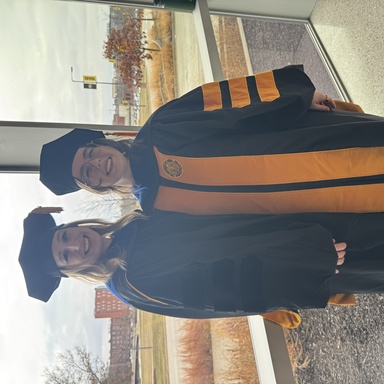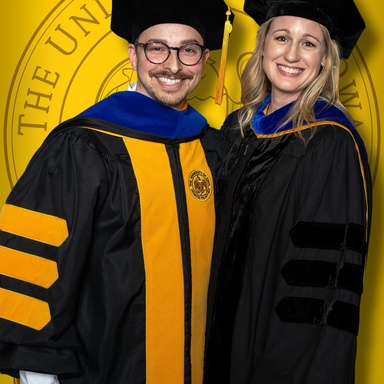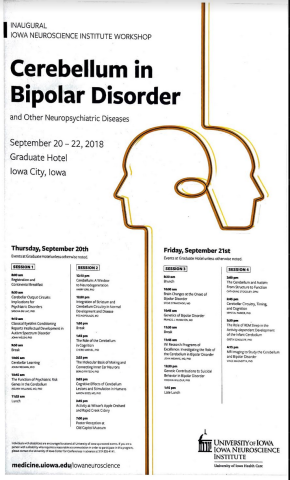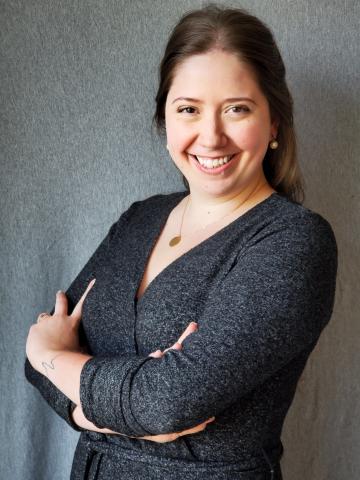Breadcrumb
- Home
- News
News
Fall 2024
Congratulations to Dr. Jessica Purnell for successfully defending her dissertation!

Spring 2024
Congratulations to Dr. Parker Abbott on his graduation!

Fall 2022
New Papers!
Heslin, K. A., Purnell, J. R., De Corte, B. J., & Parker, K. L. (2022). A limited cerebellar contribution to suprasecond timing across differing task demands. Behavioral Neuroscience, 136(5), 479–494. https://doi.org/10.1037/bne0000531
Müller Ewald VA*, Purnell JR*, Bruss JE, Barsotti EJ, Aldine AS, Mahachi KG, Wemmie JA, Magnotta VA, Boes AD, Parker KL*, Fiedorowicz JG* (2022). Posterior fossa sub-arachnoid cysts observed in patients with bipolar disorder: a retrospective cohort study. Cerebellum. https://doi:10.1007/s12311-022-01408-1
Spring 2022
SCHIZOPHRENIA RESEARCH PROGRAM OF EXCELLENCE FUNDED BY THE IOWA NEUROSCIENCE INSTITUTE
The University of Iowa has a deep history of world class schizophrenia (SZ) research under the guidance of Dr. Nancy Andreasen. Andreasen coined the term “cognitive dysmetria” to describe deficits in cognitive timing and coordination which she found involved abnormal cerebellar neural activity (Andreasen et al., 1998). Multiple lines of evidence, including genetics, animal models and human brain imaging indicate that dysfunction of the cerebello-thalamo-cortical circuitry (CTCC) plays a critical role in physiological, cognitive, and clinical impairments (Cao et al., 2019; Ji et al., 2019; Parker et al., 2014).This tradition of excellence in SZ research continues as Andreasen’s mentees and Iowa faculty inspired by her original discoveries have established a working group that bridges cutting-edge brain imaging, electrophysiology, genetic and epigenetic research, circuit level mechanistic rodent studies, and neuromodulation-based therapy development. From this already strong foundation, we have built a Research Program of Excellence (RPOE) that integrates techniques, expertise, and the development of novel treatments collaboratively in the labs of 5 women investigator-led teams: Drs. Krystal Parker and Aislinn Williams in the College of Medicine (Psychiatry), Dr. Marie Gaine in the College of Pharmacy (PSET), and Drs. Bengi Baran and Amanda McCleery in the College of Liberal Arts & Sciences (Psychological and Brain Sciences). Our RPOE will synergize the strengths of these labs, allowing us to further develop a funded Nellie Ball Collaboration (Parker, Williams, Gaine), expand on an existing clinical trial in cerebellar stimulation (Parker), and an existing early psychosis clinical research service and patient registry (PIER Program, Baran & McCleery) to ignite novel translational projects that push the current boundaries of each individual lab. We hypothesize that genetic and epigenetic factors influence CTCC-related SZ abnormalities including sleep oscillations and cognitive deficits, and that targeted cerebellar transcranial magnetic stimulation (TMS) will alter these sleep and cognitive measures, as well as CTCC-related genetic and epigenetic expression profiles. The overarching goal of this RPOE is to conduct collaborative, highly translational research to elucidate cerebellar mechanisms that contribute to SZ pathophysiology via the CTCC and to further develop cerebellar-targeted therapies.

Summer 2021


Fall 2020
The cerebellum is receiving some good press! “What I’m hoping comes out of all of this is that people can’t get away with eliminating the cerebellum from the research that they’re doing,” Parker says. “It’s almost always doing something related to whatever people are studying.”

Spring 2020
Welcome our new post doc Dr. Muller Ewald to the lab! Victoria is an outstanding electrophysiologist and addiction researcher who will head up EEG analyses for our human clinical trial.

Drs. Parker, Gaine, and Williams received a 5 year, $375,000 grant from the Nellie Ball Research Trust!
- We are extremely grateful to Nellie Ball for the opportunity to collaborate with these outstanding scientists(/friends) and advance our understanding of the therapeutic potential of the cerebellum in schizophrenia. This grant will also create a community engagement night to bring families, researchers, and community advocates together to foster relationships, widen our research focus, and ensure translation of our results back to patients with the goal of developing novel treatment options. See article here: Iowa Neuroscience Institute
